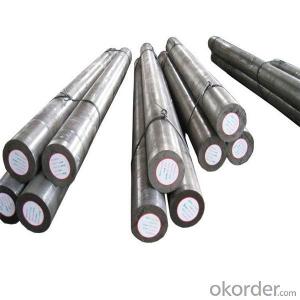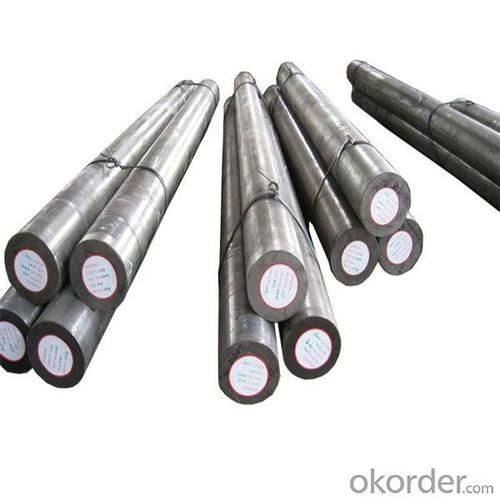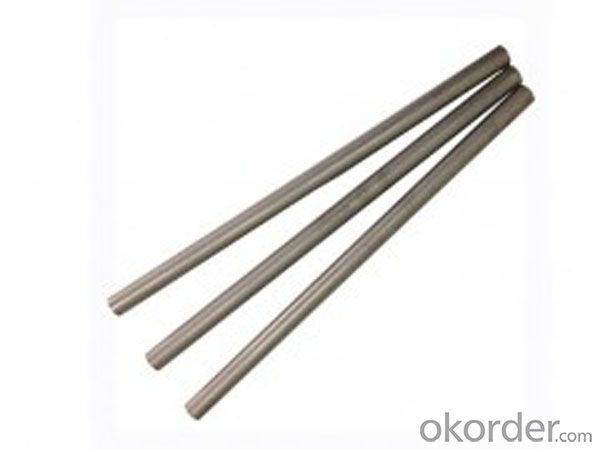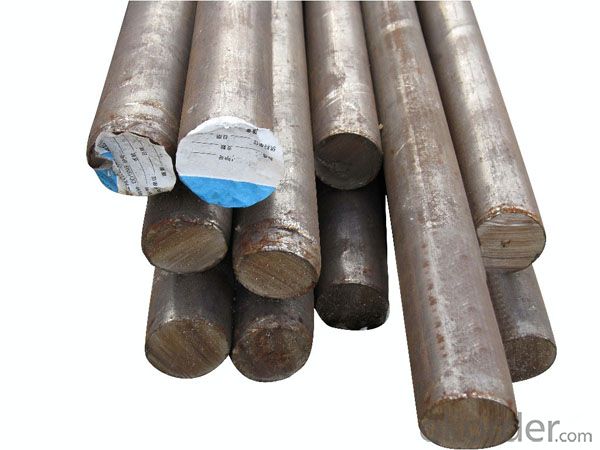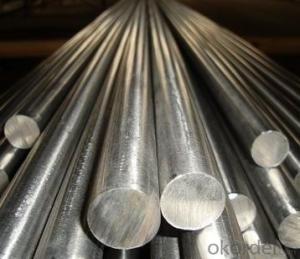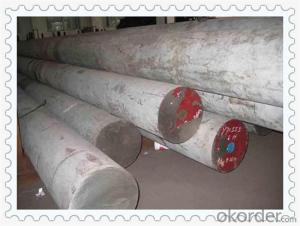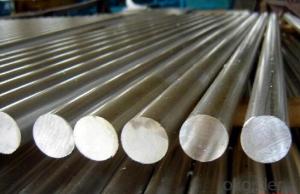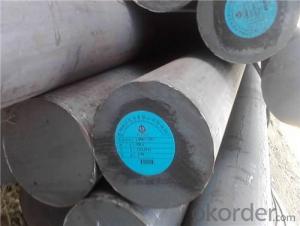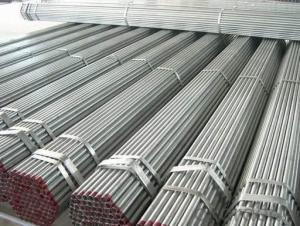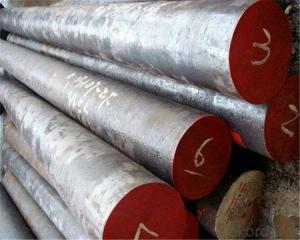SAE AISI ASTM 42CrMo4/4140 Alloy Steel Bar
- Loading Port:
- China main port
- Payment Terms:
- TT OR LC
- Min Order Qty:
- 30 m.t.
- Supply Capability:
- 10000 m.t./month
OKorder Service Pledge
OKorder Financial Service
You Might Also Like
Specification
SAE AISI ASTM 42CrMo4/4140 Alloy Steel Bar
Product Information:
1. Features Specifications: 42CrMo4 Alloy Steel Bar
2. Commodity: 42CrMo4 Alloy Steel Bar
Hot rolling craftwork and fine mechanical performance
Chemical components meet standards, delivery in black skin
3. Standards:
a) GB/T3077 42CrMo
b) JiS SCM440
c) Din 42CrMo4
d) ASTM 4140
4. Size: dia 12-160mm
5. Length:6M above
6. Packing:Bundles with iron wires
Product Overviews:
| Product Name | Typical Grades | Diameter(mm) | Standard adopted |
| Carbon Steel | 20 (1020/S20C/C22) | Ø16-Ø300 | GB/SAE/JIS/DIN |
| 40 (1040/S40C/C40) | |||
| 45 (1045/S45C/C45) | |||
| Bearing Steel | GCr9 (51100/SUJ1) | Ø12-Ø250 | |
| GCr15 (52100/SUJ2/100Gr6) | |||
| GCr9SiMn (A485-Gr.1/SUJ3) | |||
| Cr-Mo Steel | 20Cr (5120/SCr420H/20Cr4) | Ø12-Ø250 | |
| 40Cr (5140/SCr440/41Cr4) | |||
| 42CrMo(4140/SCM440/42CrMo4) | |||
| Gear Steel | 20CrNiMo | Ø16-Ø600 | |
| 20CrMn(5115/SMnC420/20MnCr5) | |||
| 20CrNiMo(8620/SNCM220/20CrMiMo2) |
Product Show:

Our Advantages:
· Industry experience over 20 years.
· Shipment of goods -More than 70 countries worldwide.
· The most convenient transport and prompt delivery.
· Competitive price with best service.
· High technical production line with top quality products.
· High reputation based on best quality products.
With our experienced, enthusiastic and dynamic staffs, we assure to bring you the products with best quality, reasonable prices and good after-sales services under the motto: Friends First, Business After.
Communication, Experience, Expertise and Best efforts are our Promises to you.
- Q: How does special steel perform in high-speed machining operations?
- Special steel is specifically designed to withstand high-speed machining operations with exceptional performance. Its unique composition and properties, including high hardness, heat resistance, and wear resistance, allow it to maintain its strength and durability even under extreme cutting speeds and temperatures. This enables special steel to deliver superior machining efficiency, precision, and surface finish, making it an ideal choice for high-speed machining operations.
- Q: How does special steel perform in extreme environments?
- Special steel is specifically designed to perform exceptionally well in extreme environments. It has excellent resistance to corrosion, high temperatures, and mechanical stress, making it highly reliable and durable. Special steel also maintains its strength and integrity even in challenging conditions, ensuring optimal performance and longevity in extreme environments.
- Q: What is the hardness range of special steel?
- The hardness range of special steel can vary depending on the specific type and composition, but it typically falls within the range of 50 to 65 HRC (Rockwell Hardness Scale).
- Q: What are the machining techniques for special steel?
- Some of the machining techniques for special steel include turning, milling, drilling, grinding, and broaching. These techniques are used to shape and form the steel into the desired dimensions and features, while also ensuring a smooth surface finish. Additionally, special steel may require specific cooling and lubrication methods during machining to minimize heat damage and maximize tool life.
- Q: What are the different forming techniques for special steel?
- Some of the different forming techniques for special steel include hot forging, cold forging, extrusion, rolling, and casting. These techniques allow for the shaping and manipulation of the steel to meet specific requirements, such as strength, durability, and dimensional accuracy. Each technique has its own advantages and can be chosen based on the desired outcome and the characteristics of the special steel being used.
- Q: What are the properties of corrosion-resistant alloy steel?
- Corrosion-resistant alloy steel possesses properties such as high resistance to corrosion, excellent strength, durability, and the ability to withstand harsh environmental conditions. It is resistant to rust, corrosion, and oxidation, making it ideal for applications in industries such as marine, chemical, and oil and gas. The alloy steel also offers good mechanical properties, including high tensile strength and toughness, which ensures its long-term performance and reliability.
- Q: How does copper influence the characteristics of special steel?
- The unique properties of copper and its role as an alloying element have a substantial impact on the characteristics of special steel. By adding small amounts of copper to steel, its strength, hardness, and resistance to corrosion can be enhanced. One of the notable advantages of copper in special steel lies in its ability to enhance the mechanical properties of the steel. With the addition of copper, the strength and hardness of the steel are increased, making it suitable for applications that demand high tensile strength and durability. This is particularly crucial in industries like construction, automotive, and aerospace, where sturdy and long-lasting steel is indispensable. Moreover, copper also improves the steel's resistance to corrosion. It forms a protective oxide layer on the steel's surface, preventing the formation of rust and other types of corrosion. This makes copper-infused steel ideal for use in harsh environments or applications where exposure to moisture or corrosive substances is common. Furthermore, copper can enhance the machinability of special steel. It acts as a lubricant during the machining process, reducing friction and heat generation. As a result, tool life is improved, energy consumption is reduced, and productivity is enhanced. In conclusion, the addition of copper to special steel has a significant impact on its characteristics. It improves the steel's strength, hardness, and resistance to corrosion, making it more suitable for demanding applications. Additionally, copper enhances the machinability of steel, leading to increased productivity and cost-effectiveness.
- Q: How does special steel contribute to reducing product failures in high-stress applications?
- Special steel contributes to reducing product failures in high-stress applications by offering enhanced strength, durability, and resistance to corrosion and wear. The unique properties of special steel allow it to withstand extreme conditions, such as high temperatures and pressures, without deformation or failure. This ensures that the products made using special steel perform reliably and have a longer service life, minimizing the risk of failures and resulting in improved safety and cost-effectiveness in high-stress applications.
- Q: Can special steel be used for aerospace engine components?
- Yes, special steel can be used for aerospace engine components.
- Q: What are the different methods of surface grinding for special steel?
- There are several methods of surface grinding for special steel, including peripheral grinding, creep feed grinding, and multi-axis grinding.
Send your message to us
SAE AISI ASTM 42CrMo4/4140 Alloy Steel Bar
- Loading Port:
- China main port
- Payment Terms:
- TT OR LC
- Min Order Qty:
- 30 m.t.
- Supply Capability:
- 10000 m.t./month
OKorder Service Pledge
OKorder Financial Service
Similar products
Hot products
Hot Searches
Related keywords
